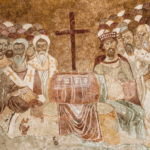Continuing our short series commemorating the seventieth anniversary of C.S. Lewis’s classic
C.S. Lewis is often depicted, at least in reformed circles, as a great Christian writer with an inadequate view of the atonement. He doesn’t believe in substitutionary atonement; Aslan dies as a ransom paid to the White Witch; he teaches that it’s Christ’s penitential attitude that saves us.
There is some justification for these complaints. In Mere Christianity, the best he can say for penal substitution (the idea that Jesus suffers the penalty for our sins) is that it “does not seem quite so immoral and silly as it used to.” When he does offer a tentative explanation of the atonement it really does appear that Jesus saves us by being repentant on our behalf:
Only a bad person needs to repent: only a good person can repent perfectly. The worse you are the more you need it and the less you can do it. The only person who could do it perfectly would be a perfect person — and he would not need it … That is the sense in which [Jesus] pays our debt, and suffers for us what He Himself needn’t suffer at all.
This certainly seems inadequate in the light of those scriptural declarations that Jesus “was pierced for our transgressions,” or “Christ redeemed us from the curse of the law by becoming a curse for us,” or that “[God] made him to be sin who knew no sin, so that in him we might become the righteousness of God.” (2Cor 5:20-21)
But there’s more to be said here.
If that’s what Lewis thought the doctrine teaches then he was right to reject it. The Father and Son are one in their judgement and in their mercy.
First the description of penal substitution that Lewis gives here—“God wanted to punish men … but Christ volunteered to be punished instead”—sounds like a caricature: God the Father grudgingly relents in response to the self-sacrifice of kind Jesus. If that’s what Lewis thought the doctrine teaches then he was right to reject it. The Father and Son are one in their judgement and in their mercy. It is God the Father who first loved us and sent his Son to be the propitiation for our sins (1John 4:10). It is the Son who will finally judge the world (John 5:22). The persons of the Trinity are not good-cop/bad-cop. Nor is God impassioned as humans are: now consumed by anger; now moved to pity. God’s wrath and mercy are not “emotions” in the sense that we experience them (though this is a topic for another post!)
Meanwhile, the second thing to note is that this is not Lewis’s final word on the atonement. The Broadcast Talks that became Mere Christianity were written in 1942. By 1953, when he penned The Lion the Witch and the Wardrobe (TLTWTW), he seems to have arrived at something very like the idea that Jesus died bearing the divine penalty of our rebellion.
Aslan Victor
Not everyone will accept this. Many interpret the atonement presented in TLTWTW as some kind of ransom paid to the Devil. Greg Boyd presents it as a “beautiful example” of Christus Victor theology (the idea that Jesus died primarily to defeat Satan). Matt Mikalatos, in his recent (and generally terrific!) series on The Chronicles of Narnia for tor.com reads it similarly:
Aslan didn’t die so that Edmund could be forgiven; Edmund had already received forgiveness … The Emperor-Beyond-The-Sea [God] is not angry at Edmund. Aslan is not angry at Edmund. Neither the Emperor nor his son are requiring this punishment (though the Deep Magic makes it clear it is not unjust for Edmund to receive this punishment). In fact, Jadis can “relinquish her claim” to Edmund’s blood should she choose. It is Jadis who wants to sacrifice Edmund at the Stone Table which is, as the dwarf says, “the proper place.”
For Mikalatos, Aslan dies to save Edmund from the White Witch and the Emperor’s deep magic (law/decree) that gives her the right to kill traitors. The Emperor himself has no problem just forgiving Edmund.[1] But if that is the case, why does the Emperor write such dangerous and counterproductive laws? This sounds like the old attempt to save God from personal involvement in judgment by speaking of sin being expiated rather than God being propitiated—as if the law and its penalties came from some other source than the mind of God.
The Emperor’s Law
Lewis himself, however, doesn’t seem so reluctant to connect the Emperor to his Laws. When Susan suggests that Aslan should work against the “Deep Magic”, Aslan frowns and says “work against the Emperor’s magic?” in a way that forestalls any further discussion.
There is further evidence in the parley between Aslan and the Witch:
“You have a traitor there, Aslan,” said the Witch. Of course everyone present knew that she meant Edmund. But Edmund had got past thinking about himself after all he’d been through and after the talk he’d had that morning. He just went on looking at Aslan. It didn’t seem to matter what the Witch said.
“Well,” said Aslan. “His offence was not against you.”
“Have you forgotten the Deep Magic?” asked the Witch.
“Let us say I have forgotten it,” answered Aslan gravely. “Tell us of this Deep Magic.”
“Tell you?” said the Witch, her voice growing suddenly shriller. “Tell you what is written on that very Table of Stone which stands beside us? Tell you what is written in letters deep as a spear is long on the fire-stones on the Secret Hill? Tell you what is engraved on the sceptre of the Emperor-Beyond-the-Sea? You at least know the magic which the Emperor put into Narnia at the very beginning. You know that every traitor belongs to me as my lawful prey and that for every treachery I have a right to a kill.”
“Oh,” said Mr. Beaver. “So that’s how you came to imagine yourself a Queen—because you were the Emperor’s hangman. I see.”
“Peace, Beaver,” said Aslan, with a very low growl.
Notice that the language is personal rather than simply legal: Aslan speaks of an offence; the Witch calls Edmund a traitor; the beaver comes right out and joins the dots by saying that the Witch’s mandate to kill traitors makes her the Emperor’s hangman.
The Emperor’s Executioner
This last concept is particularly interesting. Calvin writes much the same thing in his commentary on Ephesians 2:2. We also find it in Richard Baxter—which might be more relevant since we know Lewis read him (and took the expression “mere Christianity” from him):
[Satan] was made God’s executioner, and so had a power to punish … But mercy provided a remedy, and the Son of God interposed, and undertook the rescue of the sinners and the preservation of the world, and the recovery of God’s honour … so he might conquer Satan in the nature that was conquered and might offer himself a sacrifice for the demonstration of justice in the same nature.
I don’t want to overstate my case here. Perhaps, when Aslan tells Mr Beaver to hold his peace, it is meant to be read as a subtle authorial rebuke to overenthusiastic systematisers. And we know that Lewis maintained his reluctance to “fix on any [theory of the atonement] as if it contained and limited the truth like a scientific definition” [2] right up to his death in 1963.
Deeper Magic
Yet what we see in TLTWTW surely shows that Lewis’s hostility to (something very like) penal substitution continued to decline after his Broadcast talks. As the Witch kills Aslan she concedes that now the “Deep Magic will be appeased” (my emph.). When Aslan explains the effect of his death after the event it seems like a straightforward exchange of the righteous for the unrighteous:
“… though the Witch knew the Deep Magic, there is a magic deeper still … when a willing victim who had committed no treachery was killed in a traitor’s stead, the Table would crack and Death itself would start working backwards.”
So, the innocent dies instead of the traitor and the law of retribution turns back on itself. The White Witch, even as she imagines herself as victorious over the Emperor, makes herself a tool of his will—appeasing his law and unlocking his “deeper” purpose to forgive traitors through the sacrifice of his Son.
In this sense this is Christus Victor theology. But the real power and purpose comes from the Lawgiver.
In this sense, of course, this is Christus Victor theology. The Enemy is defeated—hoist by her own petard. But the real power and purpose comes from the Lawgiver. It is his revealed will that traitors should be subject to death; his secret plan (mystery) that an innocent should die instead of the guilty and thus invert the old pattern.
Saving God and God Saving Us
Progressive commentators often seek to save God from his own holiness and judgment. But the Bible and Lewis show us a God who is both stern and merciful. The Emperor who consigns rebels to death at the hands of the Witch, also makes a way back from that condemnation. The same Lion who lays down his life to free a traitor also declares (to Jill Pole in The Silver Chair) that he has “swallowed up girls and boys, women and men, kings and emperors, cities and realms.”
The Emperor-beyond-the-Sea does not need us to save us from his own righteous laws. We need him to save us from them. And—“thanks be to God through Jesus Christ our Lord”—he has!
[1] Which, if we are thinking theologically is like saying that God “just forgave” Old Testament sinners. Paul gives us a better answer that applies here too: God put [Jesus] forward as a propitiation … because in his divine forbearance he had passed over former sins. (Rom 3:25)
[2] From a letter to “Mr Young”, written just before his death.















